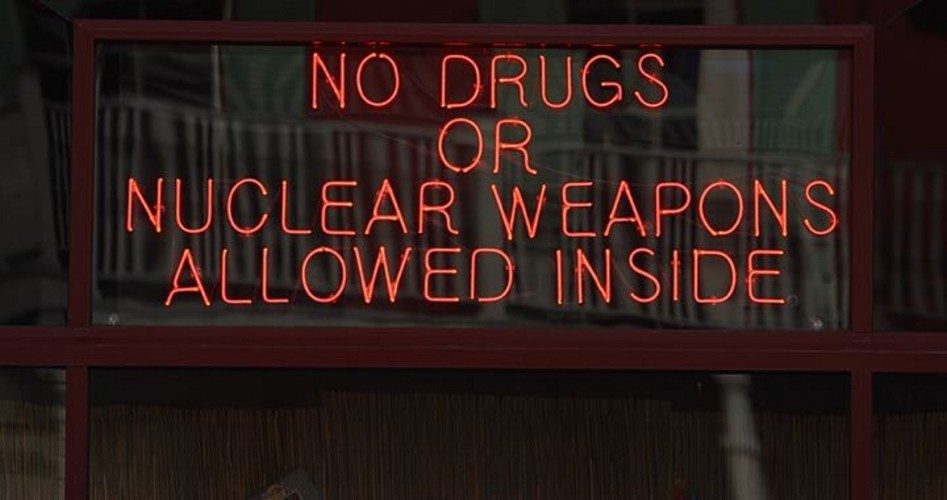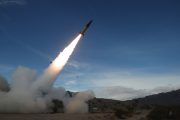
In a statement about his decision to withdraw the United States from the Iran nuclear deal signed by President Obama in 2015, President Trump issued a stern warning that “there will be very severe consequences” were the Islamic theocracy to “start their nuclear program” again. But given that at least one major premise upon which the president chose to scrap the deal is that — according to Israeli Prime Minister Benjamin Netanyahu — Iran has continued its program to develop nuclear weapons, Trump’s choice of words leads one to wonder: Is it possible to “start” something that is ostensibly ongoing?
President Trump’s remarks were made on Wednesday, one day after his announcement to withdraw the United States from the Joint Comprehensive Plan of Action (JCPOA). As the Jerusalem Post reported:
In a conversation with reporters in Washington before a cabinet meeting, Trump said he believes Tehran will eventually renegotiate the 2015 nuclear deal with the six world powers.
“I would advise Iran not to start their nuclear program. I would advise them very strongly. If they do, there will be very severe consequence,” he said.
In an interesting note, though President Trump used the word “start,” that article — by the Jerusalem Post, which no one can accuse of being an Iranian propaganda organ — carries the headline, “TRUMP WARNS IRAN: ‘DON’T RESTART YOUR NUCLEAR WEAPONS PROGRAM’.” The logical deduction — ignored in both President Trump’s remarks and the Jerusalem Post piece — is that Iran is not currently engaged in a program to develop nuclear weapons. One cannot either “start” or “restart” something one is already doing.
As this writer said in a previous article about U.S. withdrawal from the JCPOA:
There is no question that Iran has been enriching uranium as part of developing a nuclear program; the only question is whether that program is geared toward building nuclear weapons or is merely for the peaceful use of nuclear power. However, the uranium that is used for these different purposes is not the same: Weapons-grade uranium has a much higher concentration of fissile uranium than the uranium used in nuclear power plants. Tehran claims its nuclear program is not a weapons program and that it is not secretly trying to enrich uranium to the point where it could be used for weapons. The IAEA has issued 10 separate reports saying that Iran is in compliance with the requirements of JCPOA and is not developing nuclear bombs.
President Trump’s warning of “severe consequence” appears to be a not-so-veiled threat of war. Since the withdrawal already reimposes severe sanctions on Iran, President Trump must be referring to something more serious in his threat of “severe consequence” if Iran restarts the nuclear weapons program that everyone except Netanyahu seems to agree was halted in 2003. The “severe consequence” appears to be war.
This is not the first hint/threat of war with Iran to come from President Trump in the recent past. At a joint press conference with German Chancellor Angela Merkel last month, Trump brushed off a question about going to war with Iran while appearing to leave the option on the table, saying, “I don’t talk about whether or not I would use military force.” He quickly added, “But I can tell you this, they will not be doing nuclear weapons. That I can tell you. OK? They are not going to be doing nuclear weapons. You can bank on it.”
Then, in his remarks Tuesday announcing U.S. withdrawal from JCPOA, the president again visited the issue, saying, “If the regime continues its nuclear aspirations, it will have bigger problems than it has ever had before.”
Before moving on, it may be worthwhile to unpack that a bit. Notice the shift between that statement on Tuesday and his statement on Wednesday. It went from “If the regime continues its nuclear aspirations” to “I would advise Iran not to start their nuclear program.” There is a big — or as President Trump would say, “huge” — difference between “continue” and “start.”
So the question remains: Which is it — has Iran continued its nuclear weapons development program, or not?
As noted above, the IAEA — which has conducted regular inspections and has issued no less than 10 reports — says Iran is in compliance with the requirements of JCPOA and is not developing nuclear bombs. And one need not blindly accept the word of the IAEA, because as paleoconservative commentator, author, broadcaster, and politician Pat Buchanan wrote in an opinion piece published by The New American and others the day of Trump’s announcement but written earlier:
Having decided in 2003 not to build a bomb, Iran terminated its program. Then Tehran decided to negotiate with the U.S. for return of $100 billion in frozen assets from the Shah’s era — by proving they were not doing what every U.S. intelligence agency said they were not doing.
Should Iran rashly decide to go for a nuclear weapon, it would have to fire up centrifuges to enrich uranium to a level that they have never done, and then test a nuclear device, and then weaponize it.
A crash bomb program would be detected almost instantly and bring a U.S. ultimatum which, if defied, could bring airstrikes.
After writing the above, Buchanan sagely asks, “Why would Trump risk losing the means to monitor Iran’s compliance with the deal?” This writer would add to that question one of his own: “Why — since he appears (by his own choice of words) to know that Iran was indeed abiding by the JCPOA and not developing nuclear weapons — would President Trump not only end the deal, but follow up with threats of war?”
Photo: Clipart.com




